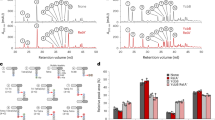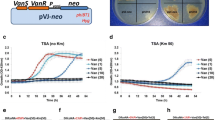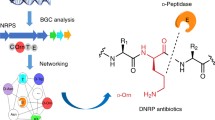Abstract.
Resistance to glycopeptide antibiotics in enterococci results from the synthesis of peptidoglycan precursors with low affinity for these antibiotics. The resistance proteins are encoded on transposons in VanA and VanB type enterococci and are involved in regulation, synthesis of new resistant precursors and elimination of wild-type sensitive precursors by hydrolysis of D-alanyl-D-alanine (D,D-peptidase activity encoded by vanX) and removal of D-alanine from UDP-N-acetylmuramyl (UDP-MurNAc)-pentapeptide (D,D-carboxypeptidase activity encoded by vanY). The substrate specificities of VanX and VanY ensure that essentially only precursors with low affinity for glycopeptide antibiotics are available for peptidoglycan synthesis in strains induced to resistance.
Similar content being viewed by others
Author information
Authors and Affiliations
Rights and permissions
About this article
Cite this article
Reynolds, P. Control of peptidoglycan synthesis in vancomycin-resistant enterococci: D,D-peptidases and D,D-carboxypeptidases. CMLS, Cell. Mol. Life Sci. 54, 325–331 (1998). https://doi.org/10.1007/s000180050159
Published:
Issue Date:
DOI: https://doi.org/10.1007/s000180050159




